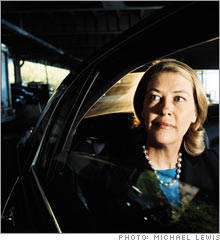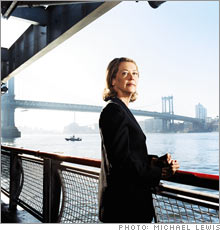The spy goes to Wall StreetEx-CIA Intelligence Chief Jami Miscik was wrong about WMD in Iraq. But in her new career, Lehman brothers depends on her to say where it's safe to put billions. An exclusive tale of intrigue and redemption from Fortune's Patricia Sellers.(Fortune Magazine) -- Every Monday at 8:45 a.m., when the dozen top executives at Lehman Brothers gather in a 31st-floor conference room at their Manhattan headquarters, they hear from the oracle. This is the weekly capital markets meeting, where the investment bankers talk about the state of the world in which they put their billions. CEO Dick Fuld presides, but typically he is not the one kicking off the conversation. That job belongs to a Wall Street newcomer few businesspeople have heard of. Her name is Jami Miscik. Her title - global head of sovereign risk - may be cryptic, but her role is clear. She is both �ber-analyst and seer, forecasting from fuzzy data about yesterday's crisis in the Middle East or today's trouble in Thailand or next year's election in Russia.
Last fall, when North Korea's nuclear test rattled global markets, the folks at Lehman (Charts, Fortune 500) were calmer than most; Miscik had forewarned them and explained how it could play out peacefully. Last December, when Venezuelan President Hugo Ch�vez's brash reelection rhetoric was publicly dismissed as idle boasting, Miscik told the Monday-morning gathering, "He really means this." She predicted an acceleration of his program to nationalize industries: "He'll be doing things bigger, bolder, and faster than even his closest allies in government expect." She was right. Lately Miscik has been talking about the possible fall of President Pervez Musharraf in Pakistan and a confluence of problems in the Middle East. "I see heightened levels of concern this fall," she says. Spoken with the confidence of a guru. But wait a minute. The seriousness with which her predictions are now taken on Wall Street needs to be reconciled with what happened at her previous job, which involved some colossal blunders that affected the course of history. Before she joined Lehman in 2005, Miscik ran the intelligence directorate of the Central Intelligence Agency under CIA chief George Tenet. Her analysts were key contributors to the erroneous judgment in the 2002 National Intelligence Estimate that Saddam Hussein possessed weapons of mass destruction - a conclusion that led Congress to authorize war with Iraq. Only a year earlier Miscik's agency had let America down in another way, picking up warning signs about 9/11 but failing to provide enough information to motivate authorities to do something about them. The story of how Miscik has survived her agency's tragic shortcomings, learned to stand up to an aggressively political Bush administration (in Ron Suskind's bestseller "The One Percent Doctrine," she is described in one scene as "shaking with rage" over White House interference), and managed to achieve platinum-level credibility on Wall Street is a tale of intrigue and redemption. Even today she remains a woman of mystery among her colleagues. Lehman president Joe Gregory says he has resisted querying her about her CIA past. "I know it's inappropriate to ask, 'What was it really like on the inside?' That's a stupid question, even though I really want to know." In interviews with Fortune, Miscik (pronounced MISS-ik) and her colleagues describe her improbable journey from Washington to Wall Street, where Lehman deploys her in the financial world not only for her steely intellect but also for her cachet as a former spy. At this year's Black Diamond Executive Conference in Beaver Creek, Colo., the firm's annual gathering for about 100 key clients, they booked her as a main speaker along with Alan Greenspan and Colin Powell. Lehman also sends Miscik to meet one-on-one with clients, who typically marvel at her geopolitical smarts. "If something is going on in the world, she's our first call," says Stuart Spodek, who heads interest rate trading at BlackRock, the asset-management firm. Kathy Cassidy, the treasurer of General Electric (Charts, Fortune 500), notes that when Miscik visits GE headquarters, "She doesn't bring notes and she doesn't have charts! Everyone else who comes to see us has charts. But she doesn't seem to need them." Miscik, 49, is not just a cerebral showpiece. Her brand of risk analysis has become critical to Wall Street decision-making as competition becomes more complex, developing markets grow more enticing, and threats (from terrorism to avian flu) turn more global. At Lehman her reports on 34 key countries are regarded as the last word in trouble spotting. Says Gregory: "Her information is infinitely better than the information you can get anywhere else that I know of." CEO Fuld credits Miscik's analysis with giving Lehman the confidence to restart business in Russia, which it exited after the country's 1998 debt crisis. "No question, she has been a valuable resource in getting us to the right place in this region," says Fuld. "From the moment I met Jami, I knew we needed her to be part of our team." Conspicuous discretion In her modest office in Lehman's Midtown headquarters, the woman who once commanded more than 1,000 CIA analysts has few artifacts on display, but one stands out for its assertion of bring-it-on street cred: a coffee cup embossed with a photo of her wielding an enormous gun. Would that be an automatic weapon? "I don't know," Miscik replies. When asked if we are to believe that a former spy wouldn't be curious, she laughs conspiratorially. Characteristic of her 22 years as the fastest-rising woman in CIA history, Miscik is conspicuous in her discretion. Her office shows no signs of a personal life except a framed picture of a 7-year-old girl. "My goddaughter," she explains. Miscik presents herself as a determined sentinel who is free of distraction and totally accountable, someone you might trust with another chance. Does she bear responsibility for the WMD conclusion in the Iraq report? "Absolutely. We got this wrong," Miscik acknowledges, while adding she had no time to beat herself up about it in the aftermath. "We were so busy, and we felt this unrelenting push to stay on top of things. It was kind of 'Just do it!'" Did the CIA fail in its responsibility leading up to 9/11? "Yes, because it happened," Miscik says. She remembers feeling helpless in the summer of 2001 to prevent the inevitable. "Our sources went silent. That terrified us," she says. "You see it coming. You're working on it. You have pieces of the puzzle. And then, where are the other pieces? We did not know the date, the place. Could we have provided more warning? Maybe." In her current role Miscik is on the lookout for everything from coups to currency crises to the ultimate disaster beyond 9/11. But besides watching for threats, she's hunting for opportunities. "In government, geopolitical risk is a bad thing," she explains. "Here at Lehman, people are risk takers. They want to understand the situation and the smart risk to take, because smart risk is opportunity." She adds, "You know what I like about it? I really like rolling up my sleeves and getting back into the analysis myself." I mention that she reminds some people at Lehman of a storybook character: Nancy Drew. "That's great. I read her as a kid," replies Miscik, the executive version of the unflappable girl detective. |
Sponsors
|



